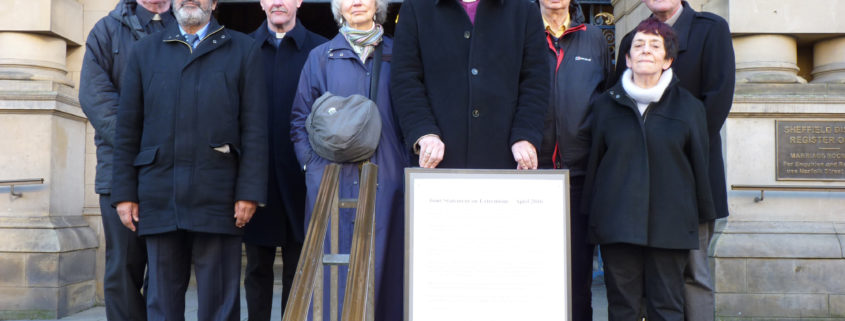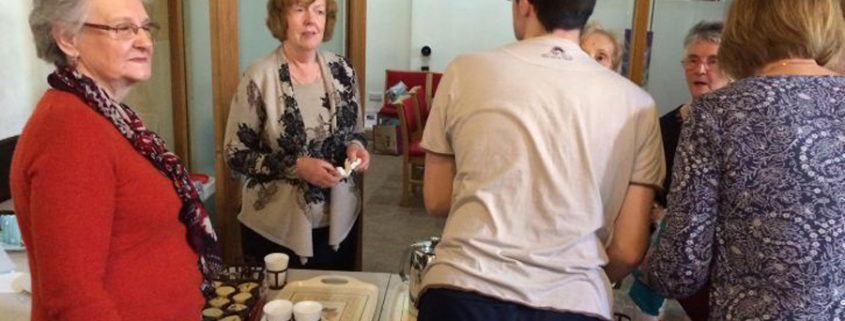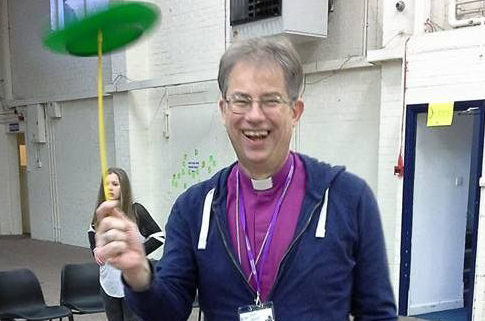The Rt Revd Dr Steven Croft, Bishop of Oxford, issues a message and prayer as King Charles III ascends to the throne.
Posts
The Rt Revd Dr Steven Croft, Bishop of Oxford, on the death of Her Majesty Queen Elizabeth II, head of the Church of England.
We’ve experienced a massive disruption to the world and the life of the Church. Bishop Steven offers a reflection on leadership in chaos.
Bishop Colin gave the following sermon during a Church at Home live stream earlier this week.
Leadership and its different styles have been very much in the media over the past few weeks.
The question, ‘Who is in charge?’ when the Prime Minister fell ill.
The calm reassuring words of our Queen.
The unpredictable statements coming from across the pond.
And the energy shown by Joe Wicks encouraging us to be active.
All of these, and many more, have given us insights, some helpful and some disconcerting, of leaders under pressure. And at the same time, as we have travelled with Jesus, from Palm Sunday through this Holy Week, we too, in this quite extraordinary and disorienting year, have been accompanying a leader under the greatest pressure he ever faced in his life.
A leader who had set his face to go to Jerusalem whilst knowing full well what awaited him there.
A leader who was willing to do the unpredictable, like riding into Jerusalem on a donkey, against the received political wisdom of his day.
A leader who had to wrestle with his closest followers jockeying for position, fighting silly personal battles, even betraying him, just when he needed them most.
A leader who encouraged them to look to a more hopeful future, but who experienced the frustration of their incomprehension.
A leader who, this evening, stripped off his outer garments and washed his disciples’ feet.
And some or all of those things, we too may have been thinking about, or experiencing, in the past weeks.
From my perspective, I have been immensely impressed by the ways in which people have stepped up in partnership to help others in their communities. What is going on in Oxfordshire and across the Thames Valley is a source to me both of pride and hope. My only warning to us all is one that Bishop Steven has already repeated many times. We are in this for the long haul and it is crucial that we take our breaks and do not aim to be running non-stop. Many of the major calls on our ministries, lay and ordained, will be coming in the next few weeks as the pressures from funerals, both those that are COVID related, and those that are not, along with their related pastoral care, mount up.
Of course, with these will come the opportunities to do some of the things we are best at doing. There will be the Memorial and Thanksgiving Services that we will be asked to take. The re-opening of our churches and the opportunity to ring our bells again can be celebrated at various points. And All Souls’ Tide could be marked as never before.
But all of that lies ahead.
For the moment what sort of leaders will we be called on to be? Two things have struck me as I have reflected in preparation for this sermon both on the scriptural passages and on the Ordinal.
The first is the call for gentleness. There is plenty of evidence that in the experience of a major trauma individuals and communities can switch quite quickly from heroic endeavour into back-biting and blame. Indeed, it is arguable that you need then to work through the inevitability of the latter in order to emerge the stronger as a result. If that is indeed the case then I, and my fellow bishops need to heed the words that our authority is given ‘ to heal, not to hurt, to build up, not to destroy’ or in the pattern of Christ and in his words, quoting Isaiah, to us all, ‘A bruised reed he will not break, and a smouldering wick he will not snuff out, till he leads justice to victory’. Much of this will be happening after I have retired but the big thing will be to give this the time it will need, individually, in our Ministry Teams, in our Congregations and in our wider communities.
If gentleness is crucial, then so will be an appreciation of the ordinary. The longer I have served as a bishop, the more I have come to appreciate the importance of the ordinary in our life of our diocese. What comes naturally and the relationships we form really matter. Recently I was reminded of that in a passage that Charles Chadwick drew to my attention. It comes from Michael Ramsey’s classic book ‘The Christian Priest Today’ though the lessons he draws from scripture apply to the laity as well as the clergy. I quoted it recently at Diocesan Synod and it is well worth repeating.
And with this I close.
‘Amidst the vast scenes of the world’s problems and tragedies you may feel that your own ministry seems so small, so insignificant, so concerned with the trivial. What a tiny difference it can make to the world that you should run a youth club, or preach to a few people in a church, or visit families with seemingly small result. But consider; the glory of Christianity is its claim that small things really matter and that the small company, the very few, the one man, the one woman, the one child are of infinite worth to God. Let that be your inspiration. Consider our Lord himself.
In a country where there were movements and causes which excited the allegiance of many – the Pharisees, the Zealots, the Essenes, and others – our Lord gives many hours to one woman of Samaria, one Nicodemus, one Martha, one Mary, one Lazarus, one Simon Peter, for the infinite worth of the one is the key to the Christian understanding of the many.
It is to a ministry like that of our Lord himself that you are called. The Gospel you preach affects the salvation of the world, and you may help your people to influence the world’s problems. But you will never be nearer to Christ than in caring for the one man, the one woman, the one child. His authority will be given to you as you do this, and his joy will be yours as well.’
+Colin
Maundy Thursday 2020
Details of our Church at Home services can be found on the website
The following text, adapted for the blog, is the core of a keynote address on leadership, given by Bishop Steven to over 500 Christian leaders at the 4th Forum christlicher Führungskräfte in Fribourg, Switzerland in March 2018. The keynote address was recently referred to in the Financial Times Business Education supplement.
A Presentation to the College of Bishops
13th September, 2016.
The College of Bishops is the gathering of all the bishops of the Church of England. We met last week for two days with the Scottish, Welsh and Irish bishops. Each church presented something of their common life. I was asked to speak about Renewal and Reform from the perspective of the Church of England. My reflection is based on the story of Moses and Jethro told in Exodus 18.
In the story of the Exodus, after the crossing of the Red Sea, Moses leads the people of Israel through the desert to Sinai. His father in law Jethro comes to meet him. Jethro watches Moses at work as he struggles with the never-ending demands of leadership. The people stand around him from morning until evening bringing their disputes.
The Israelites have come out of Egypt and crossed the Red Sea. Moses is forming them into the people of God. But Moses is overwhelmed daily by the complexity and difficulty of his calling.
Jethro watches carefully and asks a very reasonable question: “What is this that you are doing for the people?” What exactly are you trying to achieve? Moses explains as best he can.
Jethro replies: “What you are doing is not good. You will surely wear yourself out both you and this people with you. For the task is too heavy for you; you cannot do it alone”.
It’s good to have the opportunity to reflect together on Renewal and Reform as part of the Church of England’s contribution to this College of Bishops.
Renewal and Reform is a body of work which builds on 3 goals articulated by General Synod in 2010. To contribute as the national church to the common good, to facilitate the growth of the church in numbers and depth of discipleship and reimagine the church’s ministry. These goals emerged from a great deal of reflection on the mission of God over many years.
Renewal and Reform is grounded in hope in God’s purposes for the Church and the Kingdom. Our shared vision is
Helping enable the church to move to a place where:
- Followers of Jesus are faithful witnesses to the transforming love of God
- Churches are equipped to make and sustain disciples across all generations
- All forms of church are able to have the ministry and leadership they need
- Senior leadership is more representative and better equipped
- The whole church can confidently communicate our faith in a digital age
- The whole church is focussing greater energy on God’s mission
To help us get from here to there the Church has birthed around 7 different and related streams of work.
- Resourcing the Future
- Renewing Discipleship and Ministry
- Lay Leadership
- Evangelism
- Discerning and Nurturing Future Leaders
- Simplification
- How the NCIs Work
Each of them has several streams within it. Scores of people are involved in each. Any one of them could occupy us for the whole time. I’m not proposing to explore them one by one this afternoon though feel free to raise questions about any of them.
Instead I want to take Jethro’s visit to Moses as a starting point and framework for what is happening now. In particular, I want to begin with the strains and demands and complexity of episcopal leadership. I identify very much with Moses’ dilemma in this passage. I am often overwhelmed by the complexity and difficulty of my calling. I sense that’s true of other bishops I meet across the United Kingdom though we don’t always find it easy to say that to each other. We are called to leadership in a moment of great cultural change.
We need wisdom from one another, from Scripture and from the world around us. The Fathers of the Church make a great deal of Jethro. Moses is receiving advice here from someone outside the people of God, from a priest of Midian. Truth is found and recognized outside as well as within the life of the Church.
Here the truth is that things are not working as they should. “What you are doing is not good”.
Renewal and Reform has been from the beginning a listening process. Those involved have tried to gather the perspectives of every diocese, to commission research, to gather data, to learn lessons from those outside the Church, to listen to different voices. We have especially tried to listen the voices of our senior lay leaders nationally and in dioceses.
Whilst there is a huge amount of good in the life of the Church and whilst we are deeply hopeful about the future, we also need to acknowledge:
- significant and continuing decline and ageing in church attendance
- significant decline in the number of available clergy
- unsustainability of certain patterns of ministry
- lack of strategic capacity in some dioceses
- lack of leadership capacity to respond effectively to challenges
- legal and cultural constraints and institutional inertias
The different elements in Renewal and Reform have been shaped to address exactly these concerns and build the foundations for a growing church in every region of England and for every generation.
Jethro watches and listens and offers Moses some advice. It would of course be simplistic to read across from Exodus 18 to our own situation. But there is an immense amount of wisdom to be drawn from this very short text. Jethro’s priorities are somewhere near the heart of what we are seeking to do, by the grace of God, in Renewal and Reform.
“Now listen to me. I will give you counsel and God be with you. You should represent the people before God, and you should bring their case before God” (19).
Jethro’s starting point is senior leadership. What are we trying to do? How are we trained, equipped and supported in our roles? What is our distinctive and necessary contribution? How can we better learn from one another and from others within our dioceses? How can we best be agents of grace and change and renewal? How do we invest in our senior leadership in the present and develop new leaders for the future.
To meet this need the Church of England has developed a new Senior Leadership programme for bishops and deans. We have developed a new way of identifying and preparing senior leaders for the future through a new learning community. We have run one inter diocesan learning community for senior teams in dioceses to reflect together and will run more over the coming years. We are developing a peer review process to build greater strategic capacity in dioceses and to support mutual learning. We have recognized the need to have a more diverse senior leadership in terms of ethnicity and we are taking steps to address this.
I’ve been part of a large cohort of 28 diocesan bishops on the senior leadership programme this year. It’s been a very positive learning experience. We have been exposed to the best of current thinking on leadership from the Jethro’s of their day. We have begun a conversation about how to apply all of this to the role of a bishop and we are resolved to continue that conversation.
Jethro’s second point is the critical role played by the communication of faith and teaching in the formation of the people of God.
“….teach them the statutes and instructions and make known to them the way they are to go and the things they are to do”.
Forming and sustaining disciples is key to the growth and life and health of the Church and the contribution we are able to make to society and to God’s world. As bishops and senior leaders we have an absolutely critical role to play as evangelists and teachers of the faith. The Bishops of the Northern Province are with us this week after sharing faith together over four days in the Diocese of Blackburn as part of the second Crossroads Mission there.
A major strand of Renewal and Reform is focussed on evangelism through the evangelism task group, through a new focus on digital evangelism and a new intiative on students and evangelism.
It is very clear that we need further research and reflection and action to encourage the renewal of discipleship: that we need to become more of a teaching and learning church in parishes and dioceses and nationally.
One strand of that work continues to be focussed on Pilgrim, the new resource for catechesis launched three years ago at this College.
There is some information about Pilgrim on the handout you were given as you came into the room. Over 130,000 copies of Pilgrim have now been sold. We know that at least one third of all Church of England clergy have used or are planning to use Pilgrim. Over 95% of users who responded to a recent survey a year go said they would run a second course and recommend it to others.
An American version of Pilgrim was published in April. We are now developing Youth Pilgrim.
We are also about to launch the new Pilgrim Catechism: a user friendly resource to help churches form disciples, developed by the four core authors of Pilgrim. We are aiming to produce this in digital and print form by Easter 2017 with all new interactive and video elements available free on line and in app form. This is a priority project for our new digital evangelism team.
We are hoping to bring together the best thinking and reflection about catechesis with the best digital communications thinking and invest to the right scale to make a lasting impact in our nation.
Jethro has a third strand to his Renewal and Reform initiative. He focuses first on senior leadership and then on the ministry of teaching and formation. His third strand is the renewal of discipleship and ministry. He says, remember, “You cannot do it alone”.
Jesus says “The harvest is plentiful but the workers are few. Ask the Lord of the Harvest, therefore, to send out workers into his harvest field”.
“You should also look for able men among the people, men who fear God, are trustworthy and hate dishonest gain; set such men over them as officers over thousands, hundreds, fifties and tens”.
In the present day, of course, we include women as well as men among those offering leadership. Jethro advocates a massive renewal and expansion of ministry within the people of God to enable their formation and equip them to live the life God intends, to be a blessing to God’s world.
Renewing Discipleship and Ministry is a major strand of renewal and reform. The emphasis is on lay leadership and ministry as well as the ministry of the ordained. There are task groups focusing on lay leadership and lay ecclesial ministries which are due to report in the next six months.
We know we need a different mix of gifts in our ordained ministry over the coming decades. Dioceses have told us they need clergy who will be missional, collaborative and adaptable.
We have begun a significant review of our selection criteria which is now in progress, engaging with all bishops through correspondence and regional meetings. You have on your chairs two handouts which are the latest step in that process. We asked bishops to tell us about priests who inspired them – there are six vignettes on the first handout. We asked bishops about what criteria they want to highlight for us. The second handout offers an initial summary. We are hoping the new criteria can be agreed in May of next year.
Every diocese is seeking to be a growing church with a growing ministry. Because of projected clergy retirements, that will not be possible on current trends.
We are therefore embarking on a major vocations initiative, seeking to raise the number of vocations to ordained ministry by 50% throughout the 2020’s. We want to see far greater numbers of candidates from minority ethnic backgrounds and far greater numbers of younger candidates, especially younger women.
We have carried out extensive research into effective practice in vocations and we are now beginning to make that known. Dioceses are increasing their investment in vocations teams. The initial signs are encouraging.
Following Jethro’s lead, I’ve focussed on resourcing senior leadership, on evangelism and discipleship and on renewing discipleship and ministry. Those are three strands only of Renewal and Reform.
Time would fail me to tell of work done to redistribute resources to areas of poverty and to mission development; of the excellent work being done to simplify our structures; of reshaping the funding of ministerial education; of the review of our national church institutions and so much more. By all means ask or comment on any of that.
We don’t believe we have everything sorted. There is an ongoing debate around most of these areas. We do understand that the outcome of it all is in God’s hands. We do understand that we are privileged to be living in a moment of change and opportunity for God’s mission.
Many others in the room are involved in these various strands of work and I hope that they will feel able to respond to questions and comments. We in the Church of England would greatly value the wisdom of colleagues elsewhere and your prayers as we seek to enable the Church to be a blessing to the nation and the world in the coming years.
I hope you have appointments in your diary on Thursday 5th May and Thursday 23rd June. There are opportunities to vote on both days and it’s vital to use them.
On 5th May, people across South Yorkshire will vote in local elections and to elect the Police and Crime Commissioner. These elections really matter. Last time we voted in local elections less than 6 in 10 people turned out. Last time South Yorkshire elected Police and Crime Commissioners, only 15% of people bothered to vote.
On 23rd June the whole of Britain will vote in a European Referendum. Whatever your views, this is a hugely significant question. It will affect the future direction of our country, our unity, our place in the world and our economy. We all know that opinion polls sometimes get things wrong. The polls are predicting a low turnout on 23rd June on perhaps the most important national question we are facing in many years. The polls are also predicting that the outcome will be close. Your vote and mine will make a difference but only if we use it.
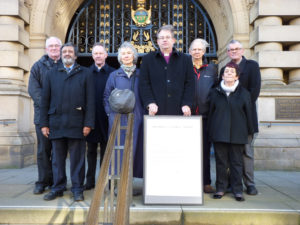 On Wednesday morning I did what I do every year at this time. I gathered on the steps of the Town Hall in Sheffield with faith leaders from across the city for a photocall and so that we can make a statement together to encourage everyone we can simply to use their vote: young and old, rich and poor. No-one has to travel far. It doesn’t take long. You can take your family and friends with you and encourage them to vote as well. Democracy gives to all of us the power to shape our society in the people we elect and in helping us to decide the great questions of our age.
On Wednesday morning I did what I do every year at this time. I gathered on the steps of the Town Hall in Sheffield with faith leaders from across the city for a photocall and so that we can make a statement together to encourage everyone we can simply to use their vote: young and old, rich and poor. No-one has to travel far. It doesn’t take long. You can take your family and friends with you and encourage them to vote as well. Democracy gives to all of us the power to shape our society in the people we elect and in helping us to decide the great questions of our age.
It seems a small thing to go to a polling station, take a ballot paper, place a cross in one box or another and put the voting slip into the box. Yet for many generations before us very few people were able to vote at all. To vote you had to be male and wealthy: one of a fortunate minority. Many people the world over do not live in a democracy and have no say or influence over their own government. We do – yet many of us will not use those votes in the next few weeks.
Having a vote means discovering the arguments: digging below the rhetoric, coming to your own point of view. The Church of England has set up a web page to help you explore the issue.
Christians should set the pace and take the lead in all of our engagement with politics and many do. Long ago the prophet Jeremiah wrote a letter to the exiles in Babylon. You can read the whole letter in Jeremiah 29 but here is the key verse:
“But seek the welfare of the city where I have sent you into exile and pray to the LORD on its behalf, for in its welfare you will find your welfare”. (Jeremiah 29.7).
In a democracy to seek the welfare of the city means to be involved, to be informed, to discuss and ask questions and above all to use the votes we have been given. Reserve the dates now.
+Steven
Dear Friends,
I write with some significant news and with a mix of emotions to the clergy and lay people of the Diocese of Sheffield.
Downing Street has announced this morning that I have been nominated as the next Bishop of Oxford. I am looking forward to the new challenge and responsibility this move will bring. At the same time I am very sorry to be leaving a Diocese and friends and a place I love dearly and where Ann and I feel very much at home.
For both Ann and myself, our seven years in the city and Diocese of Sheffield have been among the happiest and most fulfilling of our lives. I have enjoyed and appreciated almost every part of being Bishop here: the warm welcome across South Yorkshire (and the parts of East Yorkshire around Goole), the joy of working with an outstanding senior team, with dedicated and creative clergy and lay leaders and the privilege of joining in what God is doing in so many different ways and places. I have appreciated all kinds of engagement with the city and wider region served by the Diocese: with local politicians, with its economic life, with the universities, the third sector and many different local communities.
Ann has greatly enjoyed fellowship and friendship through Partners Together and the Mothers’ Union and, most of all, seeing the Parent and Toddler group grow at the Cathedral over the past five years. We have both made many friends here.
You may know that the Diocese of Oxford has been vacant since October 2014. At that time, it felt too early to consider leave Sheffield after six years. However, for various reasons the vacancy was not filled and I was invited in January this year to allow my name to be considered.
My call to this new ministry began with a sense of obedience to the wider needs of the Church and has grown from there, through the process, into a strong sense that God is indeed calling Ann and I to Oxford and calling me to a different kind of episcopal ministry.
For the first time in January, I began to realise it was no longer too early to leave Sheffield. The Diocese has grown in confidence, in unity, and in capacity for mission, particularly over the last year. We have a common vision, a strategy to carry that vision forward and a strong and united senior team. The more I pondered the question, the more this seemed a potentially good moment to hand on the ministry God has entrusted to me here to others and in time to a new Bishop.
The Diocese of Oxford is one of the largest and most complex in the Church of England. It covers the three counties of Berkshire, Buckinghamshire and Oxfordshire and stretches from Milton Keynes in the north to Newbury in the south; from the Cotswolds in the west to Slough in the east. The Diocese has a population of 2.3 million people. There are over 800 churches, almost 400 stipendiary clergy and over 200 self-supporting clergy grouped into four archdeaconries and 29 deaneries. The Diocese has an Area system with three Area bishops supporting and working with the Bishop of Oxford. There are 12 secondary and 270 primary Church schools. There are six universities. A large number of charities, industries and other agencies have their national or international headquarters in the Diocese.
The invitation to move came at a time when I was beginning to reflect on what shape my own ministry might take over the coming years. As you know, I had been planning a sabbatical later in 2016 to do some of this thinking. I have a growing sense of call to a more outward facing ministry over the next ten years or so and a desire to engage more directly in mission and evangelism and with the wider life of the nation. I could certainly have changed gear in that way and remained in Sheffield, but Oxford, with all its resources also provides an excellent place for such a ministry.
Finally, although the move will take us further from some of our family in Halifax, it will bring us much nearer to our four children and to our grandson. Paul, Andy and Beth and Sarah are all settled in Greater London. Amy and Simon are in Bristol and Ann’s mother is also there. Ann and I first met and married in Oxford and we lived there for five years immediately before we came to Sheffield. From the perspective of our past and our future, the move makes sense.
For the next few months at least it will be business as usual. I am not quite sure of the timings yet but it looks as though we will move to Oxford over the summer. A farewell service has been provisionally booked in Sheffield Cathedral for Sunday 17 July at 4.00 pm. In the meantime I am looking forward to the regular programme of parish visits, the Deanery confirmations and continuing to plan for the launch of St Peter’s College.
After I leave, Bishop Peter will lead the senior team and the diocese during the vacancy as we continue to grow a sustainable network of Christ like, lively and diverse Christian communities in every place. I will leave the Diocese in excellent hands. The process of discovering who God may be calling to the immense privilege of being the next Bishop of Sheffield is likely to begin in the autumn.
In the meantime, we continue to value your prayers. You know me well enough to know that I enjoy change but also find it very daunting. We will continue to pray for you now and for many years into the future. I have every confidence that the whole Diocese will continue to grow in faith and hope and love in the years to come.
With thanks for all that we have received through you and in you and for the grace of God in this Diocese.
With kind regards
+ Steven
A sermon at the Chrism Eucharist
Yesterday I was in St Peter’s Tankersley, one of the oldest churches in the Diocese.
 My reason for being there was to dedicate new building works. There is a new heating system, a new kitchen and space for children, a new organ, more flexible seating in the north aisle and a church extension to make room for a toilet. I always enjoy the blessing of a new water closet.
My reason for being there was to dedicate new building works. There is a new heating system, a new kitchen and space for children, a new organ, more flexible seating in the north aisle and a church extension to make room for a toilet. I always enjoy the blessing of a new water closet.
It’s a great re-ordering. But what inspired me most was the vision which shaped it. Eight years ago, Mr Charles Round, a member of the church then in his eighties, wrote this to the Rector, Keith Hale.
“The lead theft and the unfortunate resulting water damage to the organ may be a blessing in disguise which opens the door to a better use of the considerable space which the present pipe organ occupies. May I put the following ideas for your consideration? Instead of repairing the organ, clear out the organ loft and install a new electronic organ. The created area would provide a versatile and much needed space for our growing Sunday School….I feel it is time for objective, unemotional and realistic forward planning in order to assure the future continuous growth of our congregation and its influence in this parish of Tankersley”.
Charles is not in good health now and was unable to be present yesterday. But if he had been, he would have seen as I did, a wonderful new facility, filled with young children and a church ready to welcome the next generation.
“Enable with perpetual light
The dullness of our blinded sight”
Where do these words come from? We sing these words at every ordination service. They are part of the great hymn to the Holy Spirit. They echo the prayer of blind Bartimaeus: “My teacher, let me see again”[1]. They flow from the words of Jesus in Luke 4:
“The Spirit of the Lord is upon me because he has anointed me to bring good news to the poor. He has sent me to proclaim release to the captives, the recovery of sight to the blind, to let the oppressed go free”.
We gather together this evening to renew our commitment to ministry as lay ministers, as evangelists, as deacons, priests and bishops and as the whole people of God. Our prayer as we come, I suggest, should be the prayer of Bartimaeus: Lord, let me see again. For a vital part of the ministry we offer is vision: the ability to see a better future for the people of God and for God’s world.
“Enable with perpetual light the dullness of our blinded sight”. May the Lord help us to see again the purposes of God, the calling of the Church, the vision for our Diocese, the better future for our communities.
My God open our eyes and help us to see again a vision of God, Father, Son and Holy Spirit, at the centre of our life together. In the routine exercise of our ministry, we become blind. Like the Church in Laodicea we come this evening to ask for ointment for our eyes so that we may see Jesus afresh in this Holy Week and understand again the depth of our salvation even as we proclaim it to others.
Where is the vision for our ministry? Have our eyes become blind and our sight dull over this past year? Where will we find our healing?
The Book of Numbers tells the powerful story of twelve who were sent by Moses to spy out the land. It’s a cautionary tale. God has brought the people of Israel out of slavery in Egypt. They have passed through the Red Sea. They have received the law. They have travelled through the desert, guided by the pillar of cloud and the pillar of fire and sustained by daily bread from heaven. Now they stand on the threshold of the promised land.
Moses chooses 12 leaders, one from each tribe, to be the first to enter. Their task is clear. They are to see. They are to catch the vision of a land flowing with milk and honey. They are to witness the goodness and fruitfulness of the promised land. They are to come back and inspire the whole people of Israel. The land is good. God is leading us on. It is worth persevering. There is an immeasurably better future than slavery in Egypt. There is an infinitely richer life than wandering through the wilderness. Keep going. Press forward.
But that is not what happens. These twelve, “every one a leader” of the people lose their vision. They spend 40 days spying out the land. They return and speak to the people. There is indeed a rich land ahead, flowing with milk and honey. See, the fruit is good. But fear has gripped the spies. Their hearts are poisoned with despair.
Listen to what they say. The inhabitants of the land are giants. Their cities are large and strong. There are too many obstacles in the way. This is the most telling phrase. “To ourselves we seemed like grasshoppers and so we seemed to them.” Fear has corroded their perspective and their very identity.
Only two, Caleb and Joshua, sing a different song. They plead with the people to hold onto hope and a better future. This people have seen God do so much. This is the generation which saw the plagues in Egypt, the Passover, and the Red Sea. They have seen water flow from rock. But now they are gripped by fear. Rumour and terror and despair are infectious. They sap our courage. They prevent all forward movement.
The failure is a failure of leadership and vision. Disaster follows. The people rebel against God. They cry out to return to slavery in Egypt. They plead to be able even to die in the wilderness. The present reality, a parched desert, becomes more attractive than the future hope.
God in his mercy grants their request. This is a moment of judgement. For forty more long years they will wander aimlessly in the wilderness, a people going round in circles, until a whole generation have died. Only Caleb and Joshua, the leaders the keepers of the vision, will survive to lead the people into Canaan. Moses himself will come only to the threshold of what is promised. Why? Because the vision of the leaders of God’s people failed.
So let me ask you this as you come this evening to renew your commitment to the ministry to which God has called you. I ask myself the same question I ask you. What has happened to your vision? What has happened to your hope? How are you passing on vision and hope to the people of God in your parish and deanery and to one another? What are you doing to rekindle faith, to lead God’s people into a better future? Are you with Caleb and Joshua? Or with the ten who spread despair and counsel God’s people to be content with slavery and satisfied with the desert?
Every priest is called to be a person of vision. In the words of the ordinal, priests “are to proclaim the word of the Lord and to watch for the signs of God’s new creation. They are to be messengers, watchmen and stewards of the Lord.”
What are you doing to nurture the vision of God in your own life and in the life of your community? The God who has called you is the maker of heaven and earth, the God who breathes life into creation, whose very nature is love and compassion and mercy. The God who has called you is Jesus Christ, the wisdom and love of God made visible, Jesus Christ who lays down his life for the world, whose passion and death brings new life to humankind. The God who calls us is the Spirit, brooding over the universe bringing about the new creation.
What are you doing to nurture a new vision for God’s world in your community? A vision for which the world cries out: a vision of peace, of justice, of freedom from slavery, a vision of a world in which children do not die, old people live in dignity and people enjoy lives of purpose and the fruits of their own labours?
What are you doing to nurture and catch a fresh vision for God’s church? A vision which is richer and deeper than a group of people growing old together. We are called to be a church filled with God’s new life, constantly seeking ways to model our life on the character of Jesus Christ, continually striving to proclaim the faith afresh in each generation.
Each of us is called to different ministries. Each of us has been given different gifts. Some to ordained ministry and some to lay ministries. Some to be evangelists, pastors and teachers. Some to be deacons, priests or bishops.
Yet all of us are called to be women and men of vision, called to see a different future for the Church, called to watch for signs of God’s new creation, called to a vision of God at the heart of all our living.
As we come this evening to renew our commitment to ministry, as you come before God in the silence in these coming days of Holy Week, as you perhaps are led to seek prayers and anointing for healing, let this be the focus of our prayers: the renewal of our vision of God, our vision for God’s church and our vision for God’s world.
“Enable with perpetual light
The dullness of our blinded sight”.
“My teacher, let me see again”
“The Spirit of the Lord is upon me because he has anointed me to bring good news to the poor. He has sent me to proclaim release to the captives, the recovery of sight to the blind, to let the oppressed go free.”
+ Steven Sheffield
[1] Mark 10.51
Over three hundred young people aged 11-18 gathered together on a cold Saturday in January for our third annual Breathe Deep day. They came to St Thomas Philadelphia, with their leaders, from all across the Diocese. Together we were exploring faith and the rhythm of life with God. The number of young people involved has more than doubled since our first day in 2014. People love the day together and are keen to bring their friends.
 We worshipped together. We explored Scripture. This year I spoke about living our whole lives in the rhythm of the two great commandments Jesus gives: loving God and loving our neighbour as ourselves. There were workshops on prayer, on going deeper with God, on service, on transforming God’s world. All through the morning the young people text in questions on anything to do with life and faith and, just before lunch, I try and answer them. We eat together (Subway – a big highlight). Each year this part looks a little more like the feeding of the 5,000 as small groups of teenagers gather across the conference room (there are no chairs so everyone sits on the floor).
We worshipped together. We explored Scripture. This year I spoke about living our whole lives in the rhythm of the two great commandments Jesus gives: loving God and loving our neighbour as ourselves. There were workshops on prayer, on going deeper with God, on service, on transforming God’s world. All through the morning the young people text in questions on anything to do with life and faith and, just before lunch, I try and answer them. We eat together (Subway – a big highlight). Each year this part looks a little more like the feeding of the 5,000 as small groups of teenagers gather across the conference room (there are no chairs so everyone sits on the floor).
Over lunch the huge inflatables arrive and the first part of the afternoon is given over to some serious fun and games. Then it’s worship again, the results of various competitions, some filming for the music video of the day and the chance to be still, to reflect and to collect a holding cross to take away to remind us of the theme of the day.
You can catch a flavour of what happened here in the various videos made on the day and the photographs we took.
When people ask me what’s happening in the parishes of the diocese at the moment, I’m never short of things to say. There are so many stories of life and growth. But one of my favourite things, if I’m honest, has to be the new work we are beginning to do with children and young people and families. Together we are helping the next generation discover faith in Jesus Christ.
When I was 12 years old, I was on the very edge of the life of my small, local parish church and set to drift away from faith. If I had, my life would have been very different. One person in that parish was determined to do something. She had no qualifications but she started a small youth group for me and just two other teenagers. Over time she went on training courses and involved others. Through that group (and at a Diocesan event), I found faith and God found me. Jean still prays for me and for the others involved in that youth group more than forty years later.
There is no greater gift that we can pass on to children and young people in our families, in our churches, in our schools, in our wider society than the gift of faith. The whole course of a young person’s life will be affected by developing faith in childhood. It is an immense gift to know that you are loved by God, the maker of the universe; to know that you are called to a lifelong friendship with your creator; to know you can begin again through Jesus Christ and his death on the cross; to know that you are part of a worldwide family; to understand the great gift of prayer; to receive God’s guidance at life’s great crossroads; to develop Christian character; to become all that you are meant to be. All of these gifts and more are given through the development of faith in children and young people. Lives are saved, deepened and enriched, families are transformed and the world is changed.
The bible tells us many stories of those who learnt their faith as children and young people. The prophet Samuel is nurtured in faith as a child through his mother, Hannah, who prays for him and prays with him. He is nurtured in faith as a child through Eli who instructs him in prayer and in listening to God’s voice. Samuel will go on to lead Israel and change his nation. But the foundations of his life and his friendship with God are laid in childhood.
Encouraging faith within and through the family is vital. Last Saturday I commissioned Pauline Reynolds as President of the Mothers’ Union in this Diocese. The second of the Mothers’ Union’s five objectives is to encourage parents in their role to develop the faith of their children. As children grow into young people, the role of the local church is vital in nurturing and encouraging faith into adult life. You can read the sermon here
Last week the Church of England General Synod strongly encouraged parishes and dioceses to prioritise evangelism and witness with younger people. What are we doing here?
- We now have funding and support available for churches to grow families and children’s and youth work again. You can read about the Centenary Project here. Our first four workers are now in post and their work is bearing fruit.
- We have excellent training courses to help people who want to take the first steps. If you want to do something for the young people in your Church take a look at Aurora.
- We’ve already booked the date for our fourth Breathe Deep day on 28th January next year.
- If there is nothing happening in your parish for young people, the place to begin is prayer. If you can’t help yourself then email a link to this post to someone who might be able to make a new beginning. Let’s do what we can to help young people in every community to rediscover faith in Jesus Christ.
One of the most interesting conversations I had at Breathe Deep was with an adult who had come on her own to the day precisely because there were no young people in her church. It was a small beginning. I’m hoping for great things.
+Steven



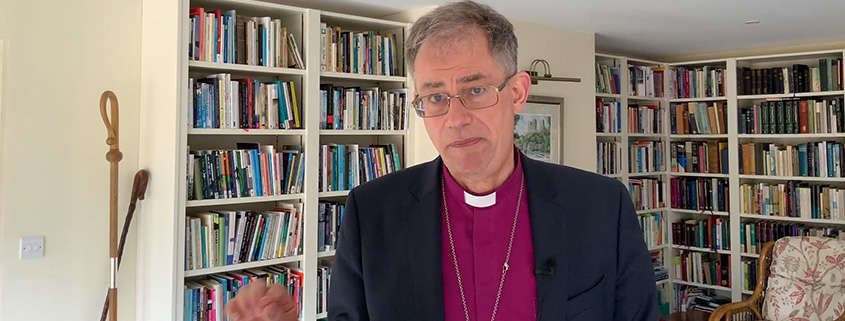
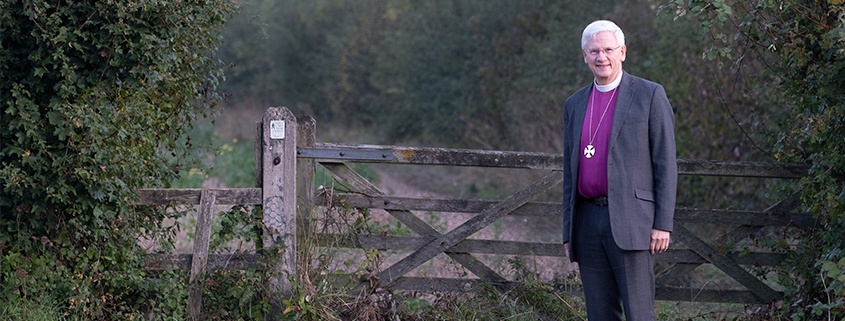 Steven Buckley
Steven Buckley
